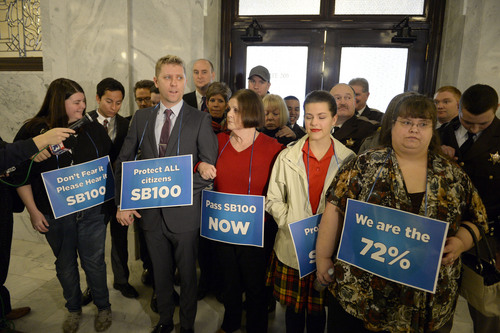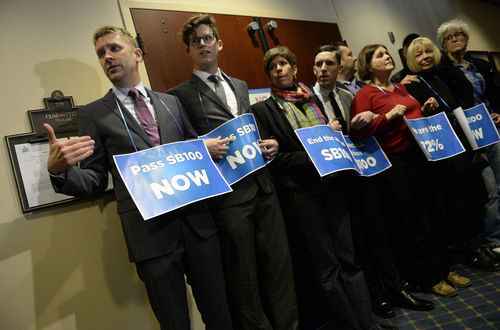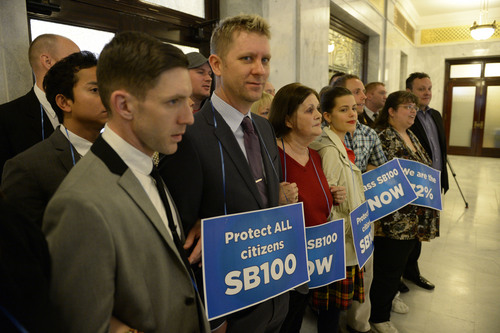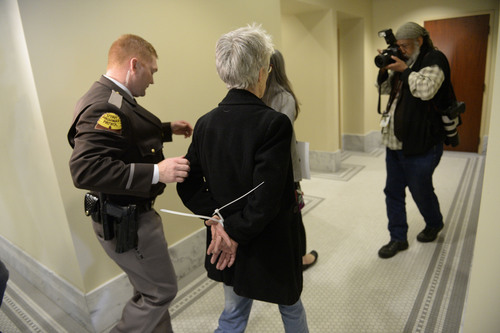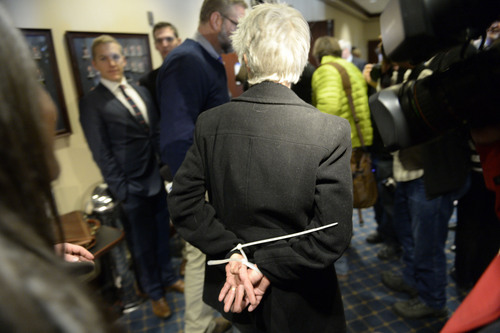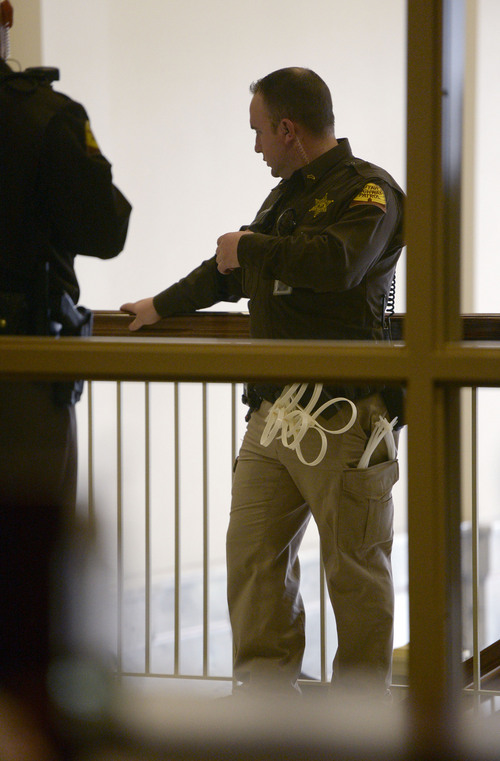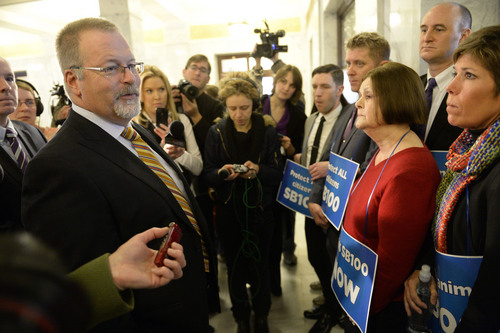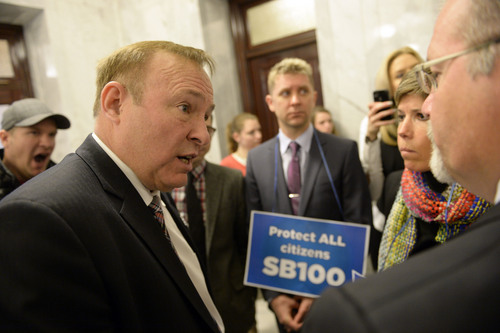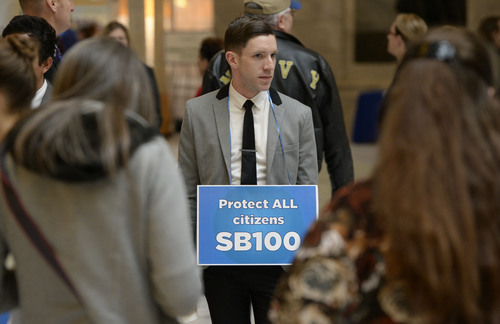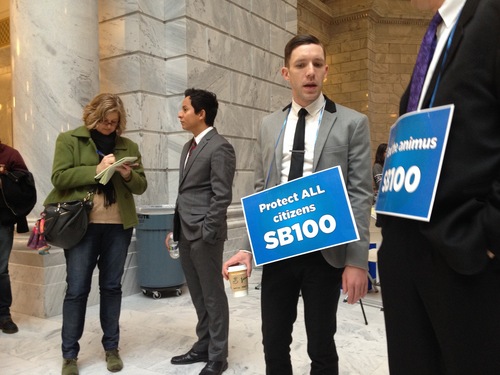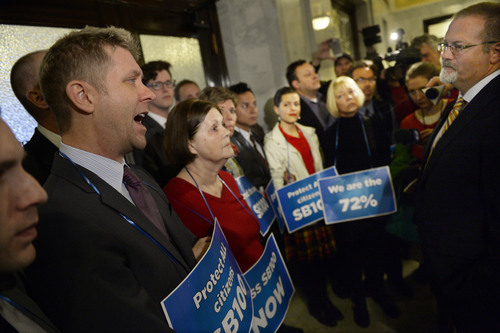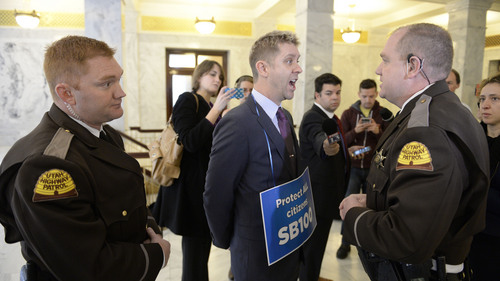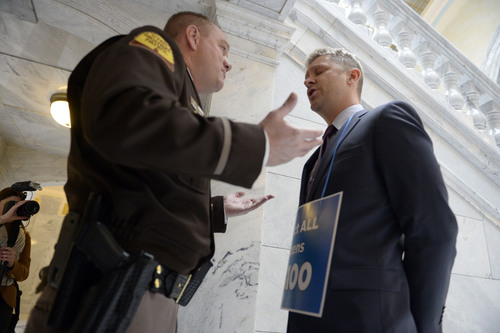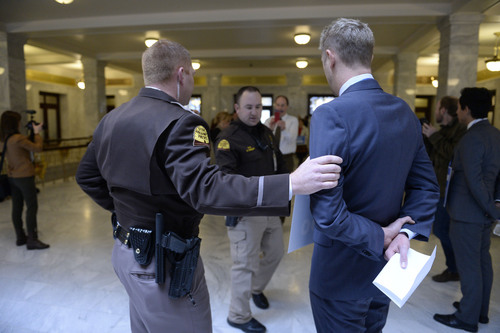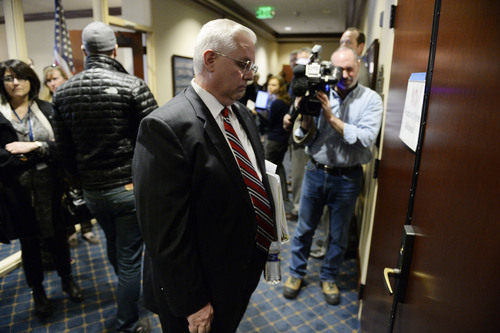This is an archived article that was published on sltrib.com in 2014, and information in the article may be outdated. It is provided only for personal research purposes and may not be reprinted.
Thirteen protesters pushing the Utah Legislature to hear a bill outlawing discrimination against gay people in employment and housing were arrested as they blocked the entrance to a committee hearing Monday afternoon.
The bill, SB100, was considered dead for the session last week after Senate Republicans voted in a closed-door meeting not to consider it.
"If the legislative process doesn't work, it's time for regular citizens to commit peaceful acts of civil disobedience," said protester Dustin Trent as a Utah Highway Patrol trooper fastened his hands behind his back with a plastic zip tie.
The 13 were arrested on suspicion of disorderly conduct, a class C misdemeanor, and disturbing a public meeting, a class B misdemeanor.
"I feel just fine," said a cuffed Gail Murdock. "It's time. It's right."
As he was handcuffed, activist Troy Williams called, "Liberty and justice for all." When asked if the arrest was worth it, he said, "if it helps our people, absolutely."
Arresting protesters is relatively unusual at the Legislature, though the demonstrators expressed their willingness to be detained unless they got a commitment from Senate President Wayne Niederhauser, R-Sandy, that the bill would be heard.
They spent several hours in front of Gov. Gary Herbert's office, moving to the adjacent Senate Building just before a meeting of the Education Committee in an attempt to find Niederhauser. He rarely attends those meetings, though, and had not arrived before the troopers cleared the group.
"We applaud their right to freedom of speech and just emphasize that we have processes here in the Senate and House," Niederhauser told The Salt Lake Tribune. "If this bill could get enough votes to pull it out of [the Senate Rules Committee], it would be addressed. … At this point there hasn't been enough votes to do that."
Several polls through the years have shown most Utahns support housing and job protections for LGBT people, but legislative leaders decided last week not to consider any bills related to LGBT issues this session in the wake of a federal ruling striking down the state ban on same-sex marriage. The state is appealing the ruling.
Leaders have said that the attorney general and Gene Schaerr, the outside counsel hired to represent Utah's appeal, suggested debating any such laws could yield statements that show "animus" that might harm the case — although Niederhauser said Monday that wasn't the only consideration.
"That's only a small portion of this whole discussion," Niederhauser said. "There's even more concern of dealing with a policy in an environment we don't understand. … It isn't just about animus. That is only part of this discussion."
SB100's sponsor, Sen. Steve Urquhart, R-St. George, acted as a go-between with the protesters Monday. They refused offers of a caucus meeting Tuesday, a town hall meeting next week and finally a closed-door session with Niederhauser and a few leaders.
"You definitely captured attention," Urquhart told the demonstrators, saying he was trying to prevent their arrest. "The process doesn't work that fast. ... Let me go and educate my colleagues, give me some time to work with them."
Though they seemed open to the town hall idea, the protesters insisted only a commitment to hear the bill — or an arrest — would disperse them.
"I don't think it's a bad plan but I'm tired of waiting," said Gail Turpin. "Do they not get that we are human beings?"
"This is a tactic to make us go away," added Donna Weinholtz.
The protesters wore signs with slogans such as "We are the 72 percent," referring topoll numbers showing a majority of Utahns support the bill, and "End the animus," a reference to their position that killing the bill was itself taking a stance on LGBT issues rather than avoiding it.
Sen. Jim Dabakis, D-Salt Lake City and chairman of Utah's Democratic Party, also spoke with the protesters, saying their effort had put SB100 back into discussion.
"This was dead. Because of these wonderful folks, the discussion is back on the table," said Dabakis. "The powers that be are just going to have to recognize that gay people are not just going to go back in the closet and be quiet anymore."
Not everyone agreed, though. Alexandra Eframo wasn't happy when she came to the committee meeting to support a bill that would increase school funding and found the door blocked. She called for the arrest of the protesters when she saw them obstructing the door.
"This kind of stuff is absurd," she said. "I'm livid. ... Put them in jail!"
Anti-discrimination bills similar to SB100 have been introduced at the Legislature for the past five years. The proposal made it out of committee last year, the furthest it has progressed.
Conservative groups this year have been more public in their opposition to the bill, running television ads and holding events across the state. Opponents say the change would create a specialized class of people and lead to lawsuits.
Supporters have also papered the Legislature with notes asking the bill be heard. It's important, said protester Kevin Garner, because LGBT people are often unsure whether they can put up pictures of themselves with their partners at work, for example.
"Am I safe to do that?" he asked. "Straight people don't have that fear."
Connie Anast-Inman, meanwhile, said she is friends with a woman who lost her job as a result of being transgender and had to live out of her car for a time.
"I'm sure she'd say that experience made her who she is, but she shouldn't have had to deal with that in the first place," she said. "We believe in equal treatment for all people."
Twitter: @lwhitehurst
Tribune reporter Robert Gehrke contributed to this story.


